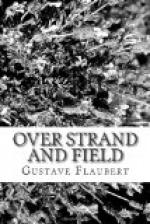At that moment I thought of some terrible city, of some frightful and immense place like Babylon or Babel, filled with cannibals and slaughter-houses, where they butchered men instead of animals; and I tried to discover a likeness to human agonies in those bleating and sobbing voices. I thought of groups of slaves brought there with ropes around their necks, to be tied to iron rings, and killed in order to feed their masters, who would eat their flesh from tables of carved ivory and wipe their lips on fine linen. Would their attitudes be more dejected, their eyes sadder or their prayers more pitiful?
While we were in Quimper, we went out one day through one side of the town and came back through the other, after tramping about eight hours.
Our guide was waiting for us under the porch of the hotel. He started in front of us and we followed. He was a little white-haired man, with a linen cap and torn shoes, and he wore an old brown coat that was many sizes too large for him. He stuttered when he spoke, and when he walked he knocked his knees together; but in spite of all this, he managed to advance very quickly, with a sort of nervous, almost febrile perseverance. From time to time, he would pull a leaf off a tree and clap it over his mouth to cool his lips. His business consists in going from one place to another, attending to letters and errands. He goes to Douarnenez, Quimperle, Brest and even to Rennes, which is forty miles away (a journey which he accomplished in four days, including going and coming). His whole ambition, he said, was to return to Rennes once more during his lifetime. And only for the purpose, mind you, of going back, of making the trip, and being able to boast of it afterwards. He knows every road and every commune that has a steeple; he takes short cuts across the fields, opens gates, and when he passes in front of a farm, he never fails to greet its owners. Having listened to the birds all his life, he has learned to imitate their chirpings, and when he walks along the roads, under the trees, he whistles as his feathered friends do, in order to charm his solitude.
Our first stop was at Loc-Maria, an ancient monastery, given in olden times by Conan III to the abbey of Fontevrault; it is situated a quarter of a mile from the town. This monastery has not been shamefully utilised like the abbey of poor Robert d’Arbrissel.[2] It is deserted, but has not been sullied. Its Gothic portal does not re-echo the voices of jailers, and though there may not be much of it, one experiences neither disgust nor rebellion. In that little chapel, of a rather severe Romance style, the only curious thing is a large granite holy-water basin which stands on the floor and is almost black. It is wide and deep and represents to perfection the real Catholic holy-water basin, made to receive the entire body of an infant, and not in the least like those narrow shells in our churches in which you can only dip your fingers. With its clear water rendered more limpid by the contrast of a greenish bed, the vegetation which has grown all around it during the religious calm of centuries, its crumbling angles, and its great mass of bronzed stone, it looks like one of those hollowed rocks which contain salt water.




